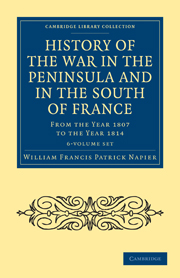 Sydney Smith is described in his ODNB entry as ‘author and wit’, which somewhat overlooks the day job as a clergyman. In the two-volume ‘life and letters’ published in 1855 by his daughter Saba (a name he invented himself), she describes his life, including his clerical career, in loving and humorous detail; the second volume is a selection of his letters, edited by his friend Mrs Sarah Austin, from which his wit, and even more his good nature, positively shine. (Saba, by the way, was married to the royal physician Sir Henry Holland, several of whose works we have reissued, and who cared devotedly for his father-in-law in his last illness.)
Sydney Smith is described in his ODNB entry as ‘author and wit’, which somewhat overlooks the day job as a clergyman. In the two-volume ‘life and letters’ published in 1855 by his daughter Saba (a name he invented himself), she describes his life, including his clerical career, in loving and humorous detail; the second volume is a selection of his letters, edited by his friend Mrs Sarah Austin, from which his wit, and even more his good nature, positively shine. (Saba, by the way, was married to the royal physician Sir Henry Holland, several of whose works we have reissued, and who cared devotedly for his father-in-law in his last illness.)
Smith (1771–1845) had a fairly miserable childhood, apparently. His father is described enthusiastically by his grand-daughter as ‘a man of singular natural gifts, very clever, odd by nature, but still more odd by design’. This respectful characterisation could cover a multitude of sins: in the case of Robert Smith these appear to have included vanity; domestic tyranny; a lack of compunction about leaving his beautiful, talented and seriously ill wife (she had epilepsy) to mind the family while he ranged the world speculating in various businesses; and (and not unconnected with this last) an amazing talent for wasting money.
Smith was sent at the age of eleven to Winchester College (where he was bullied) and then to New College, Oxford (where he was, mostly, bored). As he later remarked: ‘A genuine Oxford tutor would shudder to hear his young men disputing upon moral and political truth, forming and pulling down theories, and indulging in all the boldness of youthful discussion. He would augur nothing from it, but impiety to God, and treason to kings.’
Ordained deacon, he was given a curacy at Netheravon on Salisbury Plain in 1794: appalled at the poverty of his parishioners, and almost as poor himself, he took practical steps to help them, starting a Sunday school, and a school where twenty girls learnt needlework. On his return to Oxford after two years, he was ordained to the clergy, and given a job: the squire of Netheravon, who has befriended him, asked him to act a ‘bear-leader’ to his son before the latter went off to Oxford. Europe ceased to be an option when Napoleon invaded Switzerland, so they went to Edinburgh, where Smith stayed for five years.
It is safe to say that this was where his life began. He met Dugald Stewart, Henry Brougham, and two fellow Whigs, Francis Horner and Francis Jeffrey. Over tea in December 1801, the latter two and Smith decided to begin a periodical. Somewhat to Smith’s surprise (the way he tells it) they did: and the Edinburgh Review was supported financially by the published Archibald Constable. ‘The motto I proposed for the Review was, “Tenui Musam meditamur avena” – “We cultivate literature on a little oatmeal”; but this was too near the truth to be admitted…’ (Also, ‘It requires a surgical operation to get a joke well into a Scotch understanding.’)
At about this time, Smith married, and he subsequently moved to London, where under the patronage of Lord and Lady Holland, he became a fixture at Holland House, preached widely across the city (including at the Foundling Hospital), lectured at the Royal Institution, and was given a wealthy rectorship in Yorkshire which did not (at first) require his residence. A canonry at St Paul’s followed later.

Preaching in the Foundling Hospital chapel, from vol. 3 of Charles Knight’s ‘London‘
Now the jokes come thick and fast (and, here, in no particular order):
‘It is always considered a piece of impertinence in England if a man of less than two or three thousand a year has any opinion at all on important subjects.’
‘Preaching has become a bye-word for long and dull conversation of any kind; and whoever wishes to imply, in any piece of writing, the absence of anything agreeable and inviting, calls it a sermon.’
‘My dear Jeffrey, We are much obliged by your letter, but should be still more so were it legible.’
‘How can a bishop marry? How can he flirt? The most he can say is, “I will see you in the vestry after service.”’
‘It is a great proof of shyness to crumble bread at dinner … I do it when I sit by the Bishop of London, and with both hands when I sit by the Archbishop.’
‘My living in Yorkshire was so far out of the way, that it was actually twelve miles from a lemon.’
On the financial difficulties of the newly founded London University: ‘I understand that they have already seized on the air pump … and that bailiffs have been seen chasing the Professor of Modern History round the quadrangle.’
‘I did understand a little about the Scots kirk before you undertook to explain it to me yesterday; but now my mind is like a London fog on the subject.’
‘They do nothing in Ireland as they would elsewhere. When the Dublin mail was stopped and robbed, my brother declares that a sweet female voice was heard behind the hedge, exclaiming, “Shoot the gentleman, then, Patrick dear!”’
‘She [Elizabeth Fry] is very unpopular with the clergy: examples of living, active virtue disturb our repose, and give birth to distressing comparisons: we long to burn her alive.’
And, on a plan to surround St Paul’s cathedral with wooden decking: ‘Let the Dean and Canons lay their heads together and the thing will be done.’
Smith was not merely an author, a wit and a clergyman: many of his sermons, and his writings, campaigned for the poor and against the embedded privileges of the upper classes, from the punitive laws against poaching to the plight of child chimney-sweeps. He proposed allotments for the poor to grow vegetables, and used his own glebe land for the purpose. He supported improvement in treatment of the insane, supporting the efforts of the Tukes in York. He was also a bit of a feminist: ‘Half the talent in the universe runs to waste, and is totally unprofitable.’ So, on the whole, a thoroughly endearing (and witty, and wise) person.
Caroline







Pingback: The Small Ads | Professor Hedgehog's Journal
Pingback: Plant of the Month: August | Professor Hedgehog's Journal